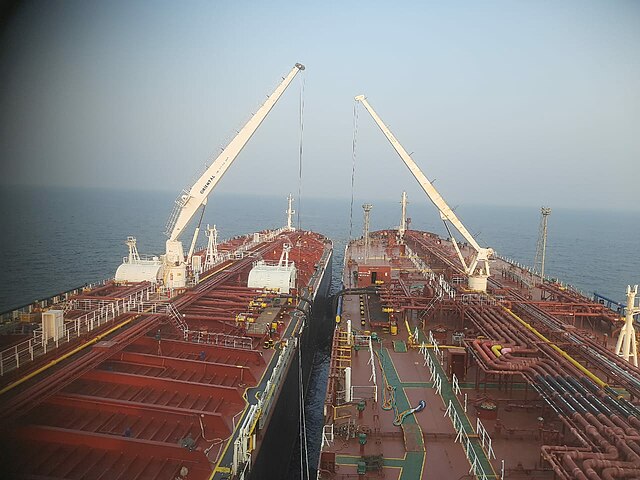Cargo ships, tankers etc are usually loaded at land-based terminals but sometimes it is necessary for various reasons for cargo to be transferred from one ship to another while at sea.
Many of these ship-to-ship transfer (STS) operations involve the transfer of liquid fuels. This can be a risky business with a danger of spillage and these operations require appropriate safety measures to be observed. Although, up to 2009 there were no international regulations concerning how STS operations should be carried out, there are now guidelines set out by the Oil Companies International Marine Forum and the International Chamber of Shipping which require appropriate contracts to be prepared between the parties involved and strict adherence to safety regulations to be observed.
However, STS transfers may also be carried out to avoid sanctions or for other illicit reasons and, in these so-called “Dark Fleet” operations, it is quite possible that the guidelines are disregarded and so the risk of spillage is considerably higher.

A recent post on the Splash website describes the risks posed by the dark fleet of tankers and how clandestine operations can lead to environmental damage. The post states that the site TankerTrackers.com, which reports on illicit cargo movement using satellite imaging, has tracked a recent STS near the coastlines of Kuwait, Iraq and Iran, where around 5,400 barrels of oil were spilled into the sea.
Efforts to track and prevent illicit STS operations, but also the profitability of such operations, means that new sites for such STS transfers are continually being sought out and, according to Splash, one such site that has recently been detected is in the area between Lesvos and Chios. In recent years this area has seen increased traffic due to the development of ports in Turkey north of Izmir, in particular that of Aliağa. The movement in this area of cargo ships, tankers, container ships and so on is very familiar to people on the beach of Vatera and to the local residents there.
So far, there have been no reports of any spillages along the southern coastline of Lesvos, but the marine ecosystem in the area is already quite fragile due to over-fishing, climate change and invasive species, and can ill afford to be subjected to further pressures.
